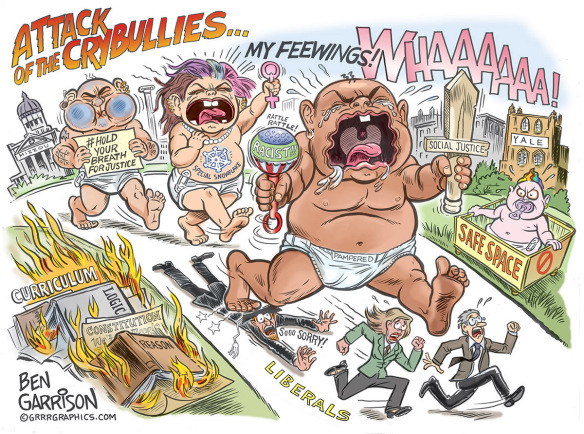by Michael Rectenwald

In a previous installment, I pointed out that in On Liberty, John Stuart Mill advocated for minority opinion to be specially “encouraged and countenanced,”1 and thus that Mill was not an absolute free market thinker where opinion is concerned. Mill suggested that minority opinion should not only be tolerated but requires special encouragement in order to gain a fair hearing. Such special encouragement would amount to the subsidization of opinion, most likely by the state. Thus, Mill did not argue for a free and fair “marketplace of ideas.”
It should be noted here that “the marketplace of ideas” is not only an analogy, where commodities are to markets what ideas are to the public square. The public square is also market in its own right, and not only metaphorically associated with the market. The expression “the marketplace of ideas” somewhat obscures rather than clarifying the situation of opinion.
Further, I argued that Mill’s advocacy for special treatment of minority opinion does not solve the problem of “social tyranny,” which Mill suggested is “more formidable than many kinds of political oppression.”2 Rather, when minority opinion is foisted on the majority through special sanctions or subsidies, “social tyranny” is actually increased rather than diminished. To the extent that a majority is unwillingly subjected to minority opinion, the majority is tyrannized.
This argument begs the question: What about the opinion of minorities? After all, the mere mention of minority opinion invokes minorities themselves. Don’t the opinions of minorities require special encouragement, special sanctions, especially when said opinions have to do with fair and equal treatment of minorities themselves? Doesn’t a free market in opinion, or an unfettered marketplace of ideas, drown out or otherwise suppress the opinions of minorities? Wouldn’t a free market in opinion thus serve to perpetuate discrimination, lack of recognition, or unfair treatment? Isn’t the state required to rectify the situation through special subsidies for opinion?
Leaving the nonremunerated voicing of opinion aside—that is, opinion expressed casually or even in public demonstrations—the question becomes whether in the actual marketplace of ideas, state subsidies are necessary for the opinions of minorities to get a fair hearing.
The question implies that state actors are specially qualified or motivated to subsidize minority opinion in order to rectify the unfair treatment of minorities—that the state is the most qualified entity for intervening in opinion to favor minorities. But it is easily demonstrated that the market provides more incentives to advocate for the fair treatment of minorities than does the state. Markets encourage legal equality among buyers and sellers. The state, meanwhile, has no monopoly on equal treatment—to say the least. Quite to the contrary, states have more incentives to discriminate against particular groups, as state prerogatives often depend on discrimination. Consider the treatment of the Japanese and Germans in America during World War II, or the treatment of Middle Easterners after 9/11. (Notice how discrimination against Middle Easterners morphed into the consternation about “Islamophobia” when the prerogatives of the state shifted from “the war on terror” under George W. Bush to the incorporation of Islamic immigrants into the electorate under Barack Obama.)
Thus, we should be quite skeptical when states impose the opinion of minorities on the majority through special programs in schools and elsewhere. Such programs likely involve “positive discrimination” against particular groups, consistent with state objectives.
In fact, discrimination is precisely what is involved in the teaching of critical race theory in schools, the military, the intelligence agencies, and in other government agencies today. Critical race theory is a minority opinion that even most blacks do not agree with. It is being foisted on the majority to establish discrimination against “whites,” in order to destroy a political contingent deemed inimical to the Democratic Party–run state. It is a means for marginalizing oppositional elements and driving others into the voting ranks of the Democratic Party by means of ideology. The state imposition of minority opinion does not serve minorities.
First published in the Mises Institute.
- 1.John Stuart Mill, On Liberty (Kitchener, ON: Batoche Books Limited, 2001), p. 45.
- 2.Mill, On Liberty, p. 9.
- Like
- Digg
- Del
- Tumblr
- VKontakte
- Buffer
- Love This
- Odnoklassniki
- Meneame
- Blogger
- Amazon
- Yahoo Mail
- Gmail
- AOL
- Newsvine
- HackerNews
- Evernote
- MySpace
- Mail.ru
- Viadeo
- Line
- Comments
- Yummly
- SMS
- Viber
- Telegram
- Subscribe
- Skype
- Facebook Messenger
- Kakao
- LiveJournal
- Yammer
- Edgar
- Fintel
- Mix
- Instapaper
- Copy Link







2 Responses
For publicizing minority opinions fairly we first need, among the opiners, an agreed to standard of fairness. What values in what proportions will define fairness for the numerous opinions expected on any subject or topic. For example, for the categories in the domain of transgender, orthogender, paragender, non gender disputes, what weight of what value of biological reality is applicable? How much proportional weight is given to emotional attachment to an emotional attachment (identification) to one’s nonexistent biological reality? Are accurate lie detector systems necessary? Who are those qualified and certified by which qualified, certified, truthful authorities to set up and oversee all protocols, opinion competitions, and winning action recommendations? Will all opinions be submittable on toilet paper for possible reuse of all asinine (as defined by the protocol test scores of overall net value) opinions?
While we’re on the subject of fairness, what are the opinions in reply to a quoted Thomas Sowell question: “Since this is an era when many people are concerned about ‘fairness’ and ‘social justice,’ what is your ‘fair share’ of what someone else has worked for?” What’s the best reply to this fundamental question from the academicians, Boke Woke Folk, run-and-walk of the mill cognoscenti and post-modern miniminded mites?